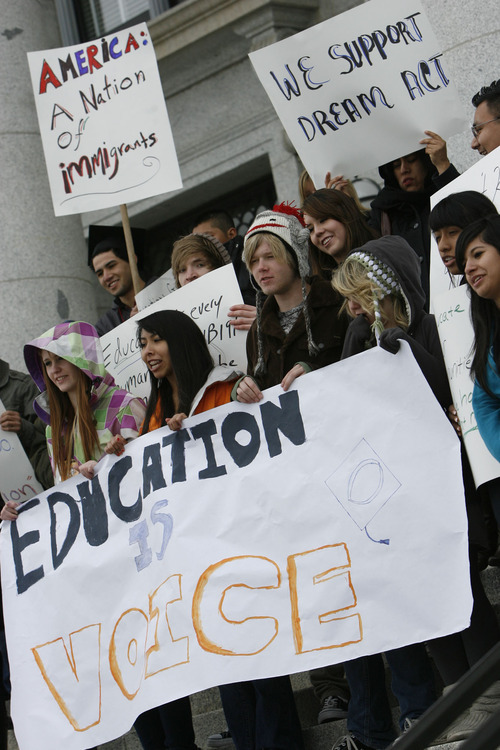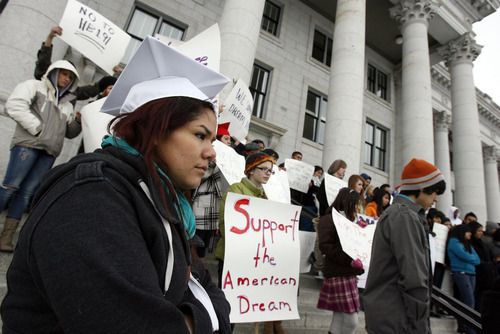This is an archived article that was published on sltrib.com in 2011, and information in the article may be outdated. It is provided only for personal research purposes and may not be reprinted.
Even as things stand, Itza Hernandez can't afford college.
The 19-year-old Hillcrest High School graduate qualifies for state-subsidized education under a 2002 law that offers resident tuition rates to any high school diploma-holder who attended school in Utah for three or more years — regardless of immigration status.
But as an undocumented resident, Hernandez can't access federal student loans. "Right now, I'm low on funds," Hernandez said. "So I can't go to school, but I would like to go back."
And the way she sees it, that dream hinges on the Utah Legislature.
Wearing a white mortarboard and a heavy jacket on a biting Saturday afternoon, Hernandez joined about 75 others on the steps of the Utah Capitol to protest House Bill 191, which would repeal in-state college tuition rates for hundreds of undocumented residents of Utah. Opponents of the bill say it would push the price of education way above the reach of most undocumented students, whose families don't generally make wages that could cover out-of-state tuition bills that could rise to upward of $20,000 a year.
"I was 3 years old when I came to this country," said Hernandez, who is 19 years old. "I don't even remember how I got here. This has always been my home and I have done everything that every other student has done to go to college."
The bill's sponsor, Rep. Carl Wimmer, R-Herriman, has said he doesn't believe it is fair to give in-state tuition to those who are in the country illegally — especially since many international students who are on legitimate visas must pay the unsubsidized nonresident rate. He has argued that the estimated 650 undocumented students who currently pay in-state tuition at the state's nine public colleges are sharing in a $5.5 million taxpayer subsidy.
But although Wimmer's bill received a favorable recommendation from the House Revenue and Taxation Committee on Feb. 18, it appears to have stalled after a substitute bill was approved that would allow the parents of undocumented students to show income tax returns to gain access to the in-state benefit. Some of the substitute bill's language has also been incorporated into an omnibus immigration bill that may be gaining steam in the Senate.
Wimmer — a Patrick Henry Caucus member who believes that state sovereignty has been jeopardized by the federal government's failure to stop illegal immigration — has said parents would use fake identification to access a benefit for which they shouldn't be entitled anyway.
And that's one area in which Wimmer and some of the Saturday protesters agree.
The substitute bill, "was a good attempt of politicians to try to find a compromise," said rally organizer Diego Ibanez, "but unfortunately the amendment creates a loophole that many people will not be able to access, because many undocumented people can't prove that they pay taxes and if they attempted to prove it, it might be through illegal ways."
Ibanez said he and other protesters were hoping to convince state lawmakers and Gov. Gary Herbert to resist any law that would make it more difficult for undocumented students to attend school.
Daniel Argueta said that lawmakers shouldn't take away "the right to education," from anyone.
"Education is the responsibility of the older generation to the younger generation," he said. "It is what we are supposed to do for our future."
And Argueta said the children who had no choice as to whether to immigrate with their parents are as much a part of that future as any of their peers.





